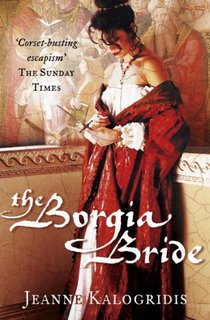
Continuing my historical novel romp, I started reading The Borgia Bride this week. It was one of my birthday presents which I had asked for on my "wishlist".
Ye gods, I am utterly loving it.
What I resent though is the fact that on the cover it is cited as "Corset Busting Excitement" by the Sunday Times. Why is it, when a man writes a historical novel it is called a historical novel (even if there is sex scenes every few pages, raping and pillaging), but when a woman writes one (there has been 2 sex scenes and I am on page 300-odd) it is called a bustier-buster? Anyway, I suppose it makes the books sell...either that or the chap/ette from the ST didn't actually read it and went on the blurb on the back!
Ahem. I am not finished with it yet - I reckon two or three more trainjourneys into town and back home should do it. So, in the meantime, I copied this across from http://www.lovereading.co.uk/book/200
Breakdown of the novel:
Italy 1492 Pope Alexander VI is elected. And so begins the Borgia reign of terror.
Alexander murders, bribes and betrays to establish his dynasty. No one is immune. Rome is a hotbed of accusation and conspiracy. Every day, the River Tiber is full of new bodies.
Sancha de Aragon, daughter of King Alfonso II of Naples, arrives in Rome newly wed to Alexander’s youngest son, Jofre. Their marriage protects Naples against the ambitions of the French King Louis and gains Spanish support for the Borgias. But Rome is very different to her beloved Naples.
The debauchery of the Borgia inner-circle is notorious: every lust is indulged and every indiscretion overlooked. Sancha is no innocent: she possesses an indomitable spirit which allows her to survive in the snake-pit, but her ancestors once rivalled the Borgias in cruelty and Sancha’s greatest fear is that blood will out.
Lucrezia Borgia’s vicious jealously stings Sancha at first, but gradually the two young women develop a cautious friendship. Lucrezia, adored by her father but used ruthlessly as a political tool, seems deceptively innocent and sympathetic, and their bond strengthens when Lucrezia is married to Sancha’s treasured brother, Alfonso.
But when Sancha falls in love with Cesare Borgia, her husband’s enigmatic older brother, she has no idea of how bizarre and internecine are the family's true ties. Alexander is rather more than an indulgent father; Lucrezia not the innocent she appears; and Cesare’s ambition burns wildly. The only safe relationship with the Borgias is none at all: as Sancha, her brother and Naples are soon to discover...
Thus far, I must say, we have another very strong female heroine. I look forward to seeing how the story developes!
No comments:
Post a Comment